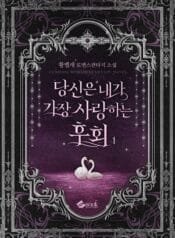On the day her husband’s body was buried, her own blossoming life was buried with him—simply for the sole reason that she was his wife.
At the age of fifteen, Astrid, who was more a child than a woman, found herself shackled by the label of a widow.
***
A foul stench assaulted her nose—the rotting smell of her husband’s decaying corpse.
For the past few days, Astrid had been left alone in the annex of the Count’s estate, guarding her late husband’s body. It was the beginning of a ritual of penance widows were required to endure.
Perhaps it was the sweltering heat or the advanced state of decay of her aged, diseased husband. By the third day after his death, the stench had become unbearable, reaching its peak by the fifth. The smell was so overwhelming that even the maids who came to help Astrid change her clothes grimaced openly.
One of them, unable to endure it, clamped her nose shut with her fingers right in front of her.
“Lady Astrid, it is time for your penance ritual. Before you change, your hair must be cut,” announced the maidservant.
Astrid’s gaze slowly turned toward the voice.
The head maid, whose expression was completely devoid of emotion, stared at Astrid with a blank gaze as though she couldn’t smell the stench at all.
In her hand was a large pair of scissors, their sharp blades glinting menacingly as if threatening Astrid. She closed her eyes tightly against the sight.
It would have been a lie to say she wasn’t afraid. However, this was an unavoidable procedure—one she could not escape, even if she died and came back to life.
‘In this country, a widow is considered a sinner,’ Astrid thought.
At the tender age of fifteen, Astrid, like a budding flower that had yet to bloom, resolved to face her reality with stoic composure.
Kneeling on the creaky wooden floor, she untied her hastily bound hair without hesitation. Her golden, silk-like locks cascaded like a waterfall, covering her small, fragile back.
“Ah!”
It was breathtakingly beautiful. A maid, unable to stop herself, let out a gasp of admiration and quickly covered her mouth with both hands when she felt the piercing gaze of the head maid.
“Ahem. Everyone, be silent. I will now cut her hair for the ritual,” said the head maid.
It was merely a haircut. Yet it felt as if she were a criminal laying her neck before the executioner’s axe. As the cold blade of the scissors grazed her nape, a chill ran down Astrid’s delicate neck.
‘It’s just something I have to endure,’ she told herself.
All she wished for was that this ritual would end quickly so she could quietly leave for the convent—to spend the rest of her days in prayer and simple tasks, living a quiet life.
Astrid prayed fervently.
The scissors grazed her golden hair, preparing to sever it, when suddenly—
“My Lady, you cannot enter! Lady Astrid is currently—!”
The door slammed open with a bang, startling everyone except Astrid. All eyes turned to the source of the commotion.
“Lady Bowell, why are you here…?” the head maid asked in shock.
But the girl addressed as Lady Bowell didn’t even glance her way. Her gaze was fixed solely on one spot—Astrid, who remained kneeling with her head bowed.
The girl’s lips curled into a smirk as she noticed the strands of golden hair scattered on the floor.
“Astrid, it suits you,” she said mockingly.
“…Fabiola?”
Opening her tightly shut eyes, Astrid raised her head to look at her cousin—or rather, at the dress she was wearing.
Fabiola was dressed in black, a color unsuitable for such a young girl, but the garment itself was crafted from luxurious material, boasting a refined design and intricate stitching. It was the very dress Astrid had worn a year ago during her father’s funeral.
In just one year, the fortunes of the two cousins had reversed. The elegant mourning dress Astrid once wore was now on Fabiola, while Astrid herself wore rough, coarse mourning clothes that couldn’t even be compared.
A year ago, Astrid was the noble daughter of Bowell, the most prestigious family in Hestian. But now she was nothing more than a sinner. Even though she had never exchanged a single word with her late husband, his death had stripped her of her title as the Countess.
“Don’t worry, Astrid. I’m here to help with your holy ritual,” Fabiola said sweetly.
“…”
“Give me the scissors. I’ll cut her hair myself.”
“My Lady, that’s…!”
“Did a mere head maid just dare interrupt me?”
Her sharp voice echoed through the room, carrying an air of authority unimaginable for a mere fifteen-year-old girl.
“L-Lady,” the head maid stammered, bowing her head helplessly.
Fabiola addressed her with a syrupy tone, “Astrid is my sister. Isn’t it only right for a sister to help with her sibling’s penance?”
“Of course, my Lady.”
A fleeting hint of pity crossed the head maid’s face, but it was lost on Fabiola, who was focused on one thing.
“Long hair is a luxury for a sinner. Forget being a woman and dedicate yourself to your penance, dear sister.”
Snip, snip.
The golden hair that was meant to be trimmed into a neat bob was instead chopped into a crude, unkempt mess. The uneven lengths made her resemble a boy, and anyone who saw it would deem it unsightly.
Looking at the once-beautiful hair now strewn across the floor, Fabiola smiled with satisfaction.
“It suits you well, Astrid.”
But her satisfaction was short-lived. Her mood plummeted when she met Astrid’s calm, unwavering gaze—a gaze devoid of any turmoil.
“I’ve hated those eyes since the beginning. The golden hair, the blue eyes—there’s not a single thing about you that pleases me. Everything about you is detestable.”
Ding. Ding. Ding.
In the distance, the bell tolled thirteen times.
It marked the announcement of a sorrowful ceremony: the joint funeral for the count, who no longer walked this world, and the fifteen-year-old Astrid, whose life had only just begun to blossom.
***
The outdoor garden of the Bonn Count’s estate.
Amid the splendid bloom of beautiful flowers, a mournful ritual began.
Her hair, haphazardly cut with scissors, and her bare feet, caked in mud, were stark against the coarse fabric of a dress she had never worn before. Astrid stood on display, her posture a public act of contrition before the divine.
This was the brutal beginning of the ritual of atonement—an inescapable procedure for any woman in the Hestian Holy Kingdom who had lost her husband.
“Astrid, your husband, the late Count, has been embraced by the divine. As a sinner who has sent her husband ahead, you must swear before the heavens to repent for him throughout your lifetime,” declared the priest.
No longer Lady Bowell, no longer Lady Bonn—just Astrid. With the loss of her husband’s protection, all that remained was the name her father had bestowed upon her.






